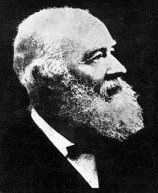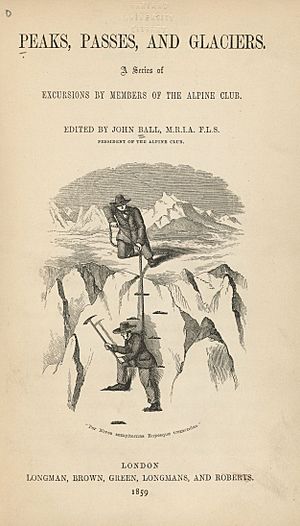John Ball (naturalist) facts for kids
Quick facts for kids
John Ball
|
|
|---|---|

John Ball.
|
|
| Under-Secretary of State for the Colonies | |
| In office 8 February 1855 – June 1857 |
|
| Monarch | Victoria |
| Prime Minister | The Viscount Palmerston |
| Preceded by | Frederick Peel |
| Succeeded by | Chichester Fortescue |
| Personal details | |
| Born | 20 August 1818 Dublin, Ireland |
| Died | 21 October 1889 (aged 71) London, England |
| Nationality | British |
| Political party | Whig |
| Alma mater | Christ's College, Cambridge |
John Ball (born August 20, 1818 – died October 21, 1889) was an important person from Ireland. He was a politician, a naturalist (someone who studies nature), and a famous traveler in the Alps mountains.
Early Life and Learning
John Ball was born in Dublin, Ireland. He was the oldest son of Nicholas Ball, who was a judge. John went to school at Oscott College and then at Christ's College, Cambridge University.
At Cambridge, he did very well in math. He was 41st in a special math exam called the "Wrangler" list. However, because he was Roman Catholic, he could not get a full degree at that time.
Even when he was young, John loved science, especially botany (the study of plants). After university, he traveled a lot in Switzerland and other parts of Europe and North Africa. He studied plants and even glaciers (large ice rivers). He also wrote articles about his discoveries for science magazines.
A Career in Politics
In 1846, John Ball started working as a helper for the "poor-law commissioner." This job was about helping people who were poor. He left this job in 1847.
In 1848, he tried to become a member of Parliament for Sligo, but he didn't win. He tried again later and won a seat for County Carlow in 1852. He was part of the Whig political party.
In 1855, he became the Under-Secretary of State for the Colonies. This meant he helped manage the British colonies around the world. He held this important job for two years.
While working in politics, John Ball helped science a lot. He supported the Palliser Expedition in Canada, which explored and mapped new lands. Because of his help, a mountain range in the Canadian Rockies was named the Ball Range after him! He also helped scientists like William Jackson Hooker learn more about the plants in the colonies.
Conquering Mountains
After leaving politics in 1858, John Ball focused on his love for nature. He became the very first president of the Alpine Club, which was started in 1857. This club was for people who loved climbing mountains.
John Ball is best known for his amazing work as an alpinist (mountain climber). He wrote a famous book called Alpine Guide (published between 1863 and 1868). This book was filled with details from his many climbs and journeys. He wrote about his observations in a clear and fun way.
He was the first person to climb a major peak in the Dolomites mountains, called Monte Pelmo, in 1857. He also traveled to Morocco in 1871 and South America in 1882. He wrote books about these trips too, which were important for science.
His Family
John Ball was married to Elisa Parolini. Her father, Alberto Parolini, was also a naturalist from Italy. John Ball passed away in London in October 1889, when he was 71 years old.


